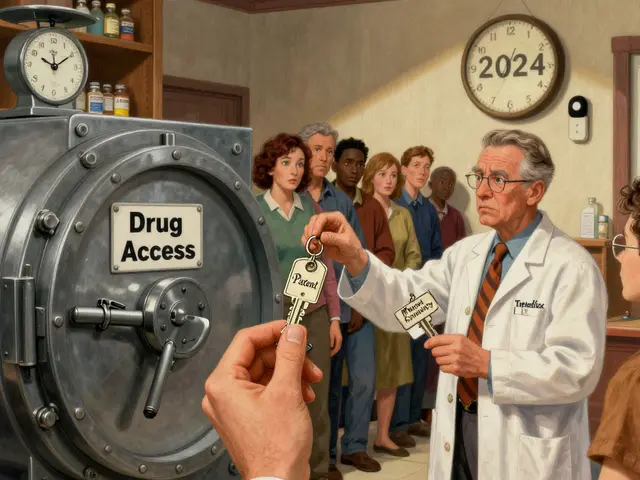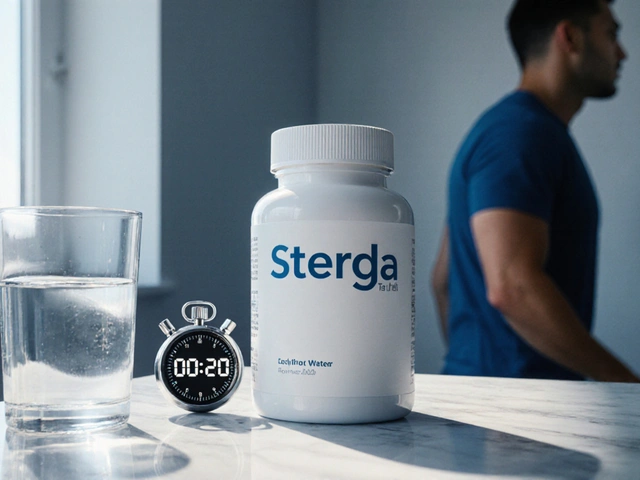Millions of people reach for Tylenol every day when they have a headache, fever, or muscle ache. It’s everywhere - drugstore shelves, kitchen cabinets, even emergency kits. But is it always the best choice? What happens when Tylenol doesn’t cut it, or you can’t take it because of liver issues or allergies? You’re not alone if you’ve wondered: acetaminophen vs. ibuprofen vs. aspirin - which one should you pick?
What Tylenol Actually Does
Tylenol is the brand name for acetaminophen, a common painkiller and fever reducer. It’s not an anti-inflammatory like ibuprofen or aspirin. That means it won’t reduce swelling in a sprained ankle or arthritic knee. But it works well for headaches, toothaches, colds, and fevers - especially in people who can’t take NSAIDs.
The science behind it isn’t fully understood, but acetaminophen mainly affects the brain’s pain and temperature centers. It doesn’t irritate the stomach lining like NSAIDs do. That’s why doctors often recommend it for kids, pregnant women, and older adults with sensitive stomachs.
But there’s a catch: your liver handles acetaminophen. Taking more than 4,000 mg in a day - even a little over the recommended dose - can cause serious liver damage. That’s why you’ll see warnings on cold medicines too. Many people don’t realize they’re doubling up when they take Tylenol and a nighttime cold syrup together.
Alternatives to Tylenol: The NSAIDs
If Tylenol isn’t working, the next go-to options are NSAIDs - nonsteroidal anti-inflammatory drugs. These include ibuprofen (Advil, Motrin), naproxen (Aleve), and aspirin. Unlike acetaminophen, they fight inflammation, which makes them better for conditions like arthritis, menstrual cramps, or sports injuries.
Ibuprofen is the most popular alternative. It kicks in faster than naproxen and lasts about 4-6 hours. It’s also available in child-friendly doses and is safe for most adults. But it can cause stomach upset, raise blood pressure, and worsen kidney problems if used long-term.
Naproxen lasts longer - up to 12 hours - so you take it less often. That’s convenient if you’re managing chronic pain. But it stays in your system longer, which means more risk if you have kidney issues or are on blood thinners.
Aspirin is the oldest of the bunch. It’s great for headaches and reducing fever, but it’s not recommended for kids under 16 because of Reye’s syndrome. It also thins the blood, which can be helpful for heart patients but dangerous if you’re prone to bleeding or about to have surgery.
When to Choose What
Here’s a simple rule of thumb:
- Use acetaminophen (Tylenol) for fever, mild pain, or if you have a sensitive stomach, kidney disease, or are pregnant.
- Use ibuprofen for swelling, menstrual pain, muscle soreness, or if you need fast relief.
- Use naproxen for longer-lasting pain like back pain or arthritis - but only if you don’t have kidney or heart risks.
- Avoid aspirin unless you’re specifically advised by a doctor - it’s rarely the first choice for everyday pain anymore.
For example, if you’re a 45-year-old with a migraine and a history of acid reflux, Tylenol is probably safer than ibuprofen. But if you’ve got a swollen knee from hiking, ibuprofen will likely work better because it tackles the inflammation.

What About Natural Alternatives?
Some people turn to turmeric, ginger, or willow bark for pain relief. Willow bark contains salicin, a compound similar to aspirin. Studies show it can help with mild to moderate pain, but it’s not as reliable or fast-acting as pharmaceuticals. Turmeric has anti-inflammatory properties, but you’d need to take large doses - and even then, it won’t replace a pill for a bad headache.
Natural doesn’t mean safe. These can interact with blood thinners, diabetes meds, or blood pressure drugs. And they’re not regulated like prescription or OTC drugs. If you’re considering them, talk to your pharmacist first.
Side Effects You Can’t Ignore
Every painkiller has trade-offs.
Acetaminophen: High doses = liver failure. Even moderate use over time with alcohol increases risk. If you drink more than 3 drinks a day, stick to lower doses or avoid it altogether.
Ibuprofen: Can cause ulcers, kidney damage, or increase heart attack risk with long-term use. Avoid if you have high blood pressure or heart disease.
Naproxen: Same risks as ibuprofen, but stronger. Not safe for people over 65 without close monitoring.
Aspirin: Bleeding risk - especially in the stomach and brain. Can cause ringing in the ears at high doses. Never give to children.
There’s no perfect drug. The best choice depends on your health, your symptoms, and what else you’re taking.

Combining Painkillers: Safe or Risky?
Some people take Tylenol and ibuprofen together for stronger relief. That’s actually okay - if done right. Many doctors recommend alternating them every 3-4 hours to manage severe pain without overloading one system.
For example:
- Take 500 mg Tylenol at 8 a.m.
- Take 200 mg ibuprofen at 11 a.m.
- Take 500 mg Tylenol at 2 p.m.
- Take 200 mg ibuprofen at 5 p.m.
This keeps pain under control while staying under daily limits for both drugs. But never mix more than two types, and never exceed 3,000 mg of acetaminophen if you’re over 65 or have liver issues.
And don’t combine with alcohol. Ever. Even one drink with acetaminophen raises liver damage risk.
Who Should Avoid These Drugs?
Not everyone can use these safely:
- Pregnant women: Acetaminophen is generally safe in all trimesters. Avoid NSAIDs after 20 weeks - they can affect fetal circulation.
- Children: Acetaminophen and ibuprofen are both safe in correct doses. Never give aspirin.
- Older adults: Kidney and liver function slow down with age. Lower doses are often needed. Naproxen and ibuprofen carry higher bleeding and kidney risks.
- People with liver disease: Avoid acetaminophen or use only under medical supervision.
- People with ulcers or bleeding disorders: Avoid NSAIDs and aspirin.
Final Take: Pick Based on Your Body, Not the Label
Tylenol isn’t the best painkiller for everyone. It’s just the most widely used. The right choice depends on what’s causing your pain, your medical history, and what other meds you’re on.
If you’re unsure, talk to your pharmacist. They can check for interactions and suggest the safest option. Don’t assume that because something is sold over the counter, it’s harmless.
For most people, Tylenol is fine for occasional use. But if you’re taking it every day for weeks, or it’s not helping, it’s time to reconsider. There are better options - if you know which one fits your body.
Can I take Tylenol and ibuprofen together?
Yes, you can take them together or alternate them, as long as you stay within the daily limits for each. For example, take Tylenol at 8 a.m., ibuprofen at 11 a.m., Tylenol again at 2 p.m., and ibuprofen at 5 p.m. This helps manage pain without overloading your liver or kidneys. Never mix more than two painkillers, and always check labels to avoid accidental overdose.
Is Tylenol safer than ibuprofen?
It depends. Tylenol is safer for your stomach and kidneys, but ibuprofen is safer for your liver. If you have liver disease or drink alcohol regularly, Tylenol can be dangerous. If you have high blood pressure, kidney issues, or a history of ulcers, ibuprofen might be riskier. Neither is universally safer - it’s about your personal health profile.
What’s the strongest over-the-counter painkiller?
Naproxen (Aleve) is the strongest OTC NSAID, lasting up to 12 hours. For non-inflammatory pain, higher doses of acetaminophen (up to 4,000 mg/day) can be effective. But strength doesn’t mean better. Naproxen carries higher risks for heart and kidney problems, especially in older adults. Always start with the lowest effective dose.
Why can’t I take aspirin if I’m under 16?
Aspirin can cause Reye’s syndrome, a rare but life-threatening condition that affects the liver and brain in children and teens recovering from viral infections like the flu or chickenpox. Even though it’s rare, the risk is serious enough that doctors and health agencies worldwide advise against giving aspirin to anyone under 16.
Can I use Tylenol for inflammation?
No. Tylenol (acetaminophen) reduces pain and fever, but it doesn’t reduce inflammation. If you have swelling from arthritis, a sprain, or tendonitis, you’ll need an NSAID like ibuprofen or naproxen. Tylenol might help the pain, but it won’t fix the underlying swelling.
What should I do if Tylenol doesn’t work?
If Tylenol isn’t helping, try ibuprofen - especially if there’s swelling or stiffness involved. If you still don’t get relief after a few doses, it might not be a simple pain issue. Persistent pain could signal an infection, nerve problem, or chronic condition. Don’t keep increasing the dose. See a doctor instead.






Comments
ridar aeen
30/Oct/2025I’ve been taking Tylenol for years because my stomach can’t handle ibuprofen, but I had no idea it could wreck your liver if you drink even one beer with it. Scary stuff. I’m gonna start reading labels like my life depends on it-because it kinda does.
Samuel Wood
30/Oct/2025Wow. So much effort put into explaining something that’s literally in the drugstore next to the gum and breath mints. Honestly, if you need a whole essay to decide between Tylenol and Advil, maybe you’re overthinking your headache. Just pick one and move on. Also, ‘acetaminophen’ is not a fancy word-it’s just the chemical name. Stop pretending you’re a pharmacist.
chantall meyer
30/Oct/2025People treat OTC meds like candy. I’ve seen grandmas take 4 Tylenol at once with whiskey and call it ‘medicine.’
Acetaminophen is fine if you’re careful. But if you’re mixing it with cold meds, you’re not a smart patient-you’re a walking liver transplant waiting to happen.
And naproxen? That’s not ‘stronger’-it’s just longer-lasting poison. If you’re over 60 and taking it daily, you’re not managing pain-you’re gambling with your kidneys.
And don’t get me started on ‘natural remedies.’ Willow bark? That’s aspirin’s grandpa. Still dangerous. Still unregulated. Still not a substitute for a doctor.
Will RD
30/Oct/2025Aspirin for kids is a no brainer dont do it
Jacqueline Anwar
30/Oct/2025It is both alarming and profoundly disappointing to observe the casual disregard for pharmacological safety in the general populace. The notion that one can casually combine acetaminophen with ibuprofen without regard for hepatic or renal thresholds reflects a systemic failure in public health literacy. Furthermore, the romanticization of ‘natural’ alternatives such as turmeric-despite its negligible bioavailability and lack of clinical efficacy-is not merely misguided; it is dangerously irresponsible. This post, while comprehensive, underestimates the cultural inertia that perpetuates self-medication as a form of virtue. The real tragedy is not the drug interaction-it is the belief that ignorance is a valid substitute for medical knowledge.
Ganesh Kamble
30/Oct/2025lol why is everyone acting like this is rocket science. Tylenol = pain. Advil = pain + swelling. Aspirin = old man blood thinner. Naproxen = expensive Advil that lasts longer. Turmeric = fancy spice. Done. You don’t need a 10-page essay to pick a pill.
Jenni Waugh
30/Oct/2025Okay but have you ever tried a 1000mg dose of acetaminophen after a 12-hour shift and a crying baby? It’s not a choice-it’s survival. And yes, I know the liver thing. I also know that if I don’t take it, I can’t work, can’t hold my kid, can’t breathe. So I take it. And I track it. And I don’t drink. And I still get judged by people who’ve never had a migraine that lasts three days. 🤷♀️💊
Theresa Ordonda
30/Oct/2025Y’all are acting like taking ibuprofen is a crime 😭 I get it, liver damage = scary. But so is chronic pain that won’t go away. I take both, on schedule, no alcohol, and I’ve been doing it for 5 years. My liver is fine. My knees are fine. My doctor approves. Stop fear-mongering. 🙃🩹
Judy Schumacher
30/Oct/2025One must question the intellectual rigor of a society that elevates the mere act of purchasing an over-the-counter analgesic to the status of a therapeutic decision requiring nuanced pharmacological deliberation. The conflation of symptomatic relief with curative intervention is not merely a linguistic error-it is a metaphysical misstep. One does not ‘choose’ a painkiller as one chooses a wine; one evaluates physiological parameters, metabolic pathways, and contraindications with the precision of a clinical trial. To treat acetaminophen as a casual option is to reduce medicine to a consumer preference-and in doing so, one surrenders agency to the very commodification of health that has rendered us all, in essence, pharmaceutical tourists.
Megan Raines
30/Oct/2025So… if I have a headache and I’m pregnant, I take Tylenol. If I have a sprained ankle, I take Advil. If I’m old and have kidney issues, I maybe take nothing and just lie down? Is that the TL;DR? Because honestly, that’s all I needed.
Mamadou Seck
30/Oct/2025Tylenol is fine if you dont drink but why do people act like its the only safe option when ibuprofen is literally safer for your liver and its not even close to being a debate. Also who still uses aspirin like its 1987